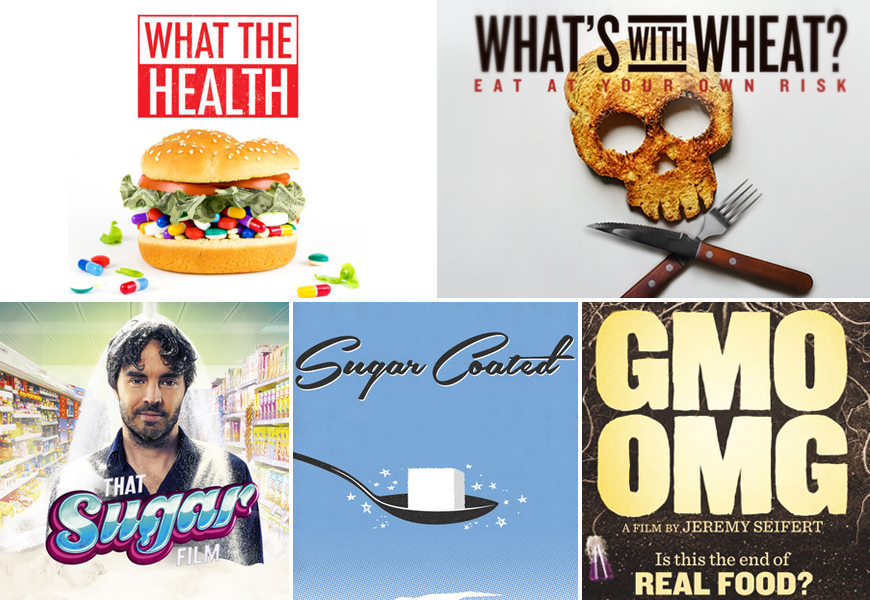There are a lot of opinions out there when it comes to what it really means to be healthy. We can all agree a balanced diet and regular exercise are both important, but that can mean something different to everyone. Diet crazes, exercise fads, new studies that uncover surprising—and contradictory results—every other day. It’s hard to keep up with what is good for you and what’s not. Your best course of action should be to seek out all the information you can find. Inform yourself and make decisions about your health based on what works best for your body.
Health, food and fitness documentaries are a great place to start, but they should also be taken with a grain of salt—after all, anyone making a film about a specific topic probably has an agenda. Here are 5 documentaries to get you started:
What the Health
2017
Netflix recently released this documentary focusing on not just benefits of an all plant-based diet but the harmful affects of eating meat (including chicken and fish) and other animal products like eggs and dairy. The film claims that processed meat causes cancer and diabetes and we’ve all been misled about what constitutes a healthy diet. There’s lots of conflicting evidence on the internet about some of the film’s claims and they are clearly pushing a vegan agenda. At the very least, What the Health demonstrates that you can’t believe everything you hear when it comes to the food you’re eating. Veganism might work for some, but it’s definitely not for everyone.
What’s With Wheat
2016
Gluten intolerance has become more and more prevalent lately making way for shelves and shelves of gluten-free snacks in every grocery store and lists of gluten-free options on every restaurant menu. But have you wondered why gluten and wheat sensitivities have become such epidemics? According to What’s With Wheat, it’s not so much the wheat itself, but how it’s being grown, harvested and processed. Wheat is in so much of our food that it’s almost impossible to stay away from unless you’re extremely diligent. The film suggests the health of future generations depends on figuring out why wheat has become such a problem—and taking real steps to fix it.
That Sugar Film
2014
According to That Sugar Film, there is sugar in 80% of the food we eat. Documentarian Damon Gameau decides to find out what sugar can do to someone by eating only food that is considered “healthy” but is actually filled with sugar. He goes from a diet that contains no refined sugar to a “health-conscious” diet that is low in fat but high in sugar. His calorie intake does not increase, but when he starts eating 40 teaspoons of sugar a day and he gains weight, develops fatty liver disease and reports feeling lethargic all the time. People who cut sugar out of their diet report that other foods actually taste better than they did before. At the very least, you’ll start reading the label on everything you eat after watching this one.
Sugar-Coated
2015
Sugar is such an obvious culprit contributing to obesity and preventable health problems that the way the sugar industry deflects blame is compared to how tobacco companies used to deny that cigarettes were bad for you. The number of people with diabetes has tripled world-wide in the last 30 years and according to Sugar-Coated, that’s because of how much sugar is in the food we’re eating. Is it a cover up? Are there really people out there purposely deceiving the public about the harm sugar can do? Or are we just choosing to ignore the evidence that all the pop, candy, baked goods and added sugar is probably causing a lot of our health problems?
GMO OMG
2013
A GMO is a genetically modified organism that has had its DNA altered or modified through genetic engineering. Most large-scale agricultural crops like soy, cotton, canola and corn are genetically modified in some way. Needless to say, GMOs are hard to avoid, but some people believe they can cause environmental damage and health problems. In GMO OMG, father of three Jeremy Siefert looks for answers regarding whether genetically modified foods are really safe. There’s information to support both sides of the fence so it can’t hurt to educate yourself on the possible effects of GMOs.












